| Srl | Item |
| 1 |
ID:
067559
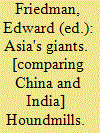

|
|
|
|
|
| Publication |
Houndmills, Palgrave Macmillan, 2005.
|
| Description |
ix, 253p.
|
| Standard Number |
1403971102
|
|
|
|
|
|
|
|
|
|
|
|
Copies: C:1/I:0,R:0,Q:0
Circulation
| Accession# | Call# | Current Location | Status | Policy | Location |
| 050582 | 306.0951/FRI 050582 | Main | On Shelf | General | |
|
|
|
|
| 2 |
ID:
120810


|
|
|
|
|
| Publication |
2013.
|
| Summary/Abstract |
This analysis of the dangerous forces increasingly dynamizing Beijing-Washington relations explains why the usual proposals for increasing the cooperative aspects of USA-PRC relations will not succeed. It builds on the policy analysis and policy proposals of others who understand what a disaster it would be if China-America relations were to continue to grow worse. It makes a suggestion for restructuring the institutions of the international political economy so as to construct fundamental over-lapping interests between America and China. The author finds that without some difficult and basic changes in the relations, worst case outcomes become ever more probable.
|
|
|
|
|
|
|
|
|
|
|
|
|
|
|
|
| 3 |
ID:
120397
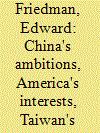

|
|
|
|
|
| Publication |
2013.
|
| Summary/Abstract |
For international relations realists, the rise of a world power changes the global distribution of power. By so doing, it redefines national interests and compels governments to rethink old policies that suddenly do not make sense. Given the rise of China, it is not surprising that some American analysts suggest a change in U.S. policy toward Taiwan ending U.S. arms sales. This article weighs the arguments for and against that policy change in the context of China's awesome rise and of American interests in the Asia-Pacific region.
|
|
|
|
|
|
|
|
|
|
|
|
|
|
|
|
| 4 |
ID:
128496
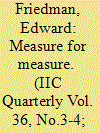

|
|
|
| 5 |
ID:
005465
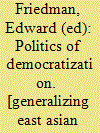

|
|
|
|
|
| Publication |
Boulder, Westview Press, 1994.
|
| Description |
xv, 276p.
|
| Standard Number |
0813322650
|
|
|
|
|
|
|
|
|
|
|
|
Copies: C:1/I:0,R:0,Q:0
Circulation
| Accession# | Call# | Current Location | Status | Policy | Location |
| 036693 | 321.8095/FRI 036693 | Main | On Shelf | General | |
|
|
|
|
| 6 |
ID:
073904
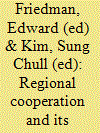

|
|
|
|
|
| Publication |
London, Routledge, 2006.
|
| Description |
xiv, 219p.
|
| Standard Number |
041539922X
|
|
|
|
|
|
|
|
|
|
|
|
Copies: C:1/I:0,R:0,Q:0
Circulation
| Accession# | Call# | Current Location | Status | Policy | Location |
| 051655 | 327.5/FRI 051655 | Main | On Shelf | General | |
|
|
|
|
| 7 |
ID:
076676
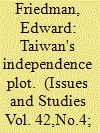

|
|
|
| 8 |
ID:
084901
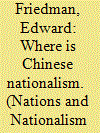

|
|
|
|
|
| Publication |
2008.
|
| Summary/Abstract |
Since the rise of Chinese nationalism at the end of the nineteenth century, different political groups have sought to mobilise regional support by identifying with the national agenda of regional preferences. There have been changing contestations appealing to north, south, center, west and east. By analysing these moving identities, one can escape a misleading homogenisation of actual multi-strandedness and better understand the nature and potential consequences of ongoing political struggles using conflicting nationalisms on behalf of diverse political agendas, some more war-prone than others.
|
|
|
|
|
|
|
|
|
|
|
|
|
|
|
|